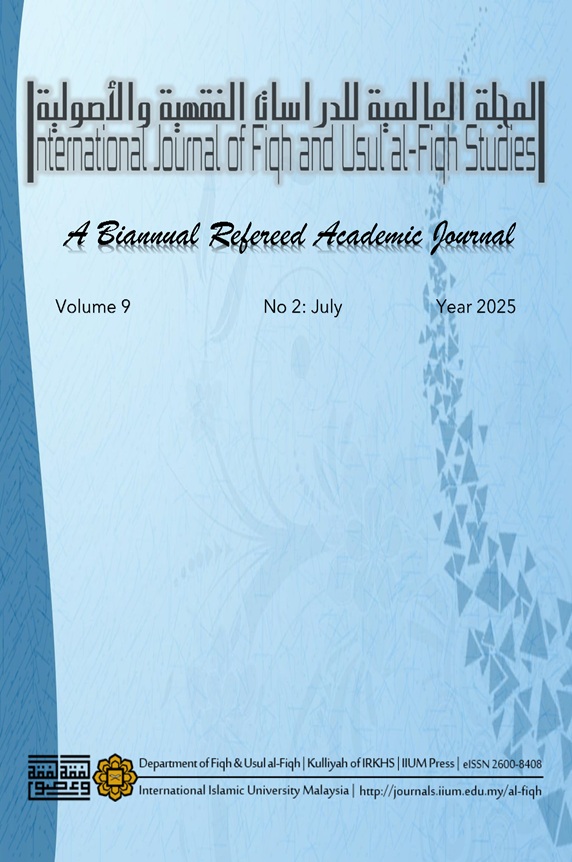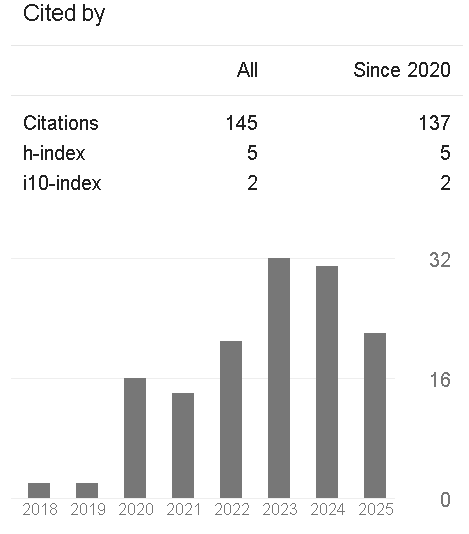The Role of Islamic Finance in Achieving Sustainable Development: Islamic Banks as a Model
DOI:
https://doi.org/10.31436/ijfus.v9i2.379Keywords:
Islamic Finance, Sustainable Development, Islamic Banking, Social Impact Finance, Environmental FinanceAbstract
This research examined the role of Islamic finance in achieving sustainable development goals through a case study of Islamic banks. The research also reviewed Islamic banks’ contribution to promoting social justice through zakah, waqf, qarḍ ḥasan (benevolent loans), and financing community and educational projects, which reflects on poverty reduction and enhancing solidarity. Additionally, light was shed on the environmental role that banks can play through financing environmentally friendly projects. The research adopted a descriptive analytical approach through analyzing relevant literature and published financial data. The study concluded that Islamic financing formulas have great capacity to support vital sectors such as education and health, if directed toward sustainable development projects. The research also concluded that Islamic banks, with their Sharīʿah flexibility and financial capabilities, are capable of being a fundamental lever for achieving sustainable development in Islamic and global communities. The research ended with a call to establish specialized sustainable development units within the institutional structure of Islamic banks, aiming to activate this role more effectively. The research recommends enhancing transparency and Sharīʿah governance in Islamic banks and directing financial products toward achieving social and environmental impact alongside economic returns.
Downloads
Metrics
References
ʿAbd al-Raḥmān, M. ʿA. (2011). Ṣiyagh al-tamwīl al-islāmiyyah wa-atharuhā fī al-nashāṭ al-iqtiṣādī: Dirāsat ḥālat al-Bank al-Islāmī lil-Tanmiyah. Majallat al-Gharī lil-ʿUlūm al-Iqtiṣādiyyah wa-al-Idāriyyah, 7(19)
Abū Zayd, M. (2010, April 17). Hal tastaṭīʿ al-maṣārif al-islāmiyyah al-musāhamah fī taḥqīq al-tanmiyah al-mustadāmah? Al-Jarīdah al-Iqtiṣādiyyah. http://www.aleqt.com/2010/04/17/article_380293.html
al-ʿĪd, F., & Mahdīd, F. al-Z. (2008). Ahammiyyat al-zakāh fī taḥqīq al-tanmiyah al-mustadāmah fī al-Jazāʾir: Dirāsat ḥālat ṣundūq al-zakāh li-wilāyat al-Masīlah (p. 6). Paper presented at the Second International Scientific Conference on the Role of Non-Profit Islamic Finance (Zakat and Waqf) in Achieving Sustainable Development, Saʿd Daḥlab University – Blida.
al-Bayṭār, M., & Farḥāt, M. (n.d.). Al-ifṣāḥ al-muḥāsibī ʿan al-masʾūliyyah al-ijtimāʿiyyah fī al-maṣārif al-islāmiyyah. Majallat al-Iqtiṣād al-ʿĀlamī. https://giem.kantakji.com/article/details/ID/145
al-Lajnah al-ʿĀlamiyyah lil-Bīʾah wa-al-Tanmiyah. (1987). Mustaqbalunā al-mushtarak. Oxford University Press.
al-Munaẓẓamah al-Islāmiyyah lil-Tarbiyah wa-al-ʿUlūm wa-al-Thaqāfah (ISESCO). (n.d.). Al-ʿālam al-islāmī wa-taḥaddiyāt al-tanmiyah al-mustadāmah. https://www.isesco.org.ma/pub/ARABIC/Tanmoust/P5.htm
al-Ṣallābī, ʿA. M. (n.d.). Asmā al-maṭālib fī sīrat amīr al-muʾminīn ʿAlī ibn Abī Ṭālib (Vol. 1). [Publisher not mentioned].
al-Sharīf al-Raḍī. (n.d.). Nahj al-balāghah (Vol. 3).
al-Shawkānī, M. ibn ʿA. (1997). Fatḥ al-qadīr (ʿA. al-R. ʿAmīrah, Ed., 2nd ed.). Dār al-Wafāʾ.
ʿAmūrah, J., & Ḥamdī, M. (2008). Al-zakāh wa-dawruhā fī taḥrīk ʿajalat al-iqtiṣād wa-taḥqīq al-tanmiyah al-mustadāmah. Paper presented at the Second Non-Profit Islamic Finance Conference, Saʿd Daḥlab University – Blida.
Khalaf, F. Ḥ. (2007). Al-bunūk al-islāmiyyah. Dār al-Jidār lil-Kitāb al-ʿĀlamī.
Laḥlīḥ, al-Ṭ. (n.d.). Al-tamwīl al-islāmī wa-dawruhu fī taḥqīq al-tanmiyah al-mustadāmah. Paper presented at the Conference on Sustainable Development and Efficiency in Using Available Resources.
Lajnat al-Umam al-Muttaḥidah al-Iqtiṣādiyyah wa-al-Ijtimāʿiyyah li-Gharb Āsiyā (al-Iskuwā). (1998). Mushārikat al-mujtamaʿāt al-maḥalliyyah fī al-tanmiyah al-ḥaḍariyyah fī manṭiqat al-Iskuwā. Al-Iskuwā.
Majallat al-Majmaʿ al-Fiqhī al-Islāmī. (1986). Majallat al-Majmaʿ al-Fiqhī al-Islāmī, 1(3), 3.
Malāwī, A. (2009). Dawr al-waqf fī al-tanmiyah al-mustadāmah. Paper presented at the Third Waqf Conference, Islamic University, Medina.
Muntaṣir, ʿA. al-Ḥ., & al-Aḥmad, M. Kh. (n.d.). Al-muʿjam al-wasīṭ (I. Anīs et al., Eds.). Dār al-Daʿwah.
Mūshīt, D. (2000). Mabādiʾ al-tanmiyah al-mustadāmah (B. Shāhīn, Trans.). Al-Dār al-Duwaliyyah lil-Istithmārāt al-Thaqāfiyyah.
Ṣāliḥī, Ṣ., & Ibn ʿAmārah, N. (2014). Al-waqf al-islāmī wa-dawruhu fī taḥqīq al-tanmiyah al-mustadāmah – ʿarḍ lil-tajribah al-jazāʾiriyyah fī tasyīr al-awqāf. Al-Majallah al-Jazāʾiriyyah lil-Tanmiyah al-Iqtiṣādiyyah.
Yaḥyāwī, W. (n.d.). Dawr al-maṣārif al-islāmiyyah fī taḥqīq al-tanmiyah al-mustadāmah ʿan ṭarīq tafʿīl istithmār amwāl al-zakāh. Saʿd Daḥlab University – Blida
Downloads
Published
How to Cite
Issue
Section
License
Copyright (c) 2025 International Journal of Fiqh and Usul al-Fiqh Studies

This work is licensed under a Creative Commons Attribution-NonCommercial 4.0 International License.
The IIUM journal follows the open access policy.
Consent to publish: The Author(s) agree to publish their articles with IIUM Press.
Declaration: The Author(s) declare that the article has not been published before in any form and that it is not concurrently submitted to another publication, and also that it does not infringe on anyone’s copyright. The Author(s) holds the IIUM Press and Editors of the journal harmless against all copyright claims.
Transfer of copyright: The Author(s) hereby agree to transfer the copyright of the article to IIUM Press, which shall have the exclusive and unlimited right to publish the article in any form, including in electronic media. However, the Author(s) will reserve the right to reproduce the article for educational and scientific purposes provided that the written consent of the Publisher is obtained. For the article with more than one author, the corresponding author confirms that he/she is authorized by his/her co-author(s) to grant this transfer of copyright.





















